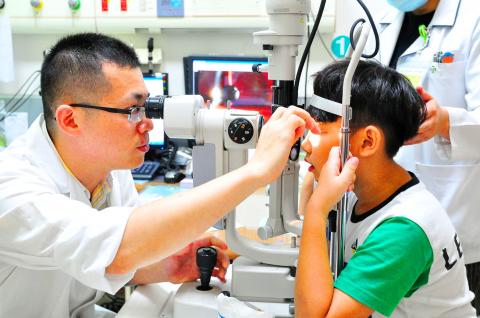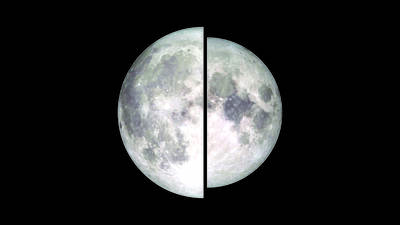Myopia is increasingly affecting young people in Taiwan, with close to 90 percent of children in Taiwan’s major cities suffering from nearsightedness. If myopia is not controlled and a child’s vision worsens, their eyesight could be damaged, even with treatment. In these cases, it could cause complications such as degeneration, detachment or tearing of the retina, macular degeneration, cataracts and glaucoma. In serious cases surgery may be required, and the complications could even lead to impaired vision.
Main preventative treatments for myopia are the application of Atropine drops or wearing corneal reshaping lenses. The more concentrated the Atropine drops are, the more effective they are at controlling the myopia, but the stronger the side effects, including photophobia, blurred vision, will be and, if used incorrectly, they could even drastically exacerbate the myopia.
Corneal reshaping lenses are contact lenses to be worn overnight, and must be worn for at least eight hours while sleeping. The biggest problem and greatest risk with these contacts, just as with conventional contact lenses, is infection. If they are not cleaned properly they could breed pathogenic bacteria, leading to corneal infection.

Photo: CNA
照片:中央社
(CNA, translated by Paul Cooper)
台灣近視年輕化,台灣都市近九成小朋友近視。小朋友近視若未能控制而惡化,即使治療,視力仍可能受損,將會引發視網膜變性、視網膜剝離、視網膜裂孔、黃斑部退化、白內障、青光眼等併發症。嚴重者需要開刀治療,甚至可能導致失明。
預防近視,點散瞳劑及配戴角膜塑型片是主要方法。其中散瞳劑的濃度愈高,抑制近視效果愈強,副作用也愈強,包括畏光、視力模糊,但若不規則使用,反而會使近視度數急速增加。
角膜塑型片是夜戴型隱形眼鏡,需要在睡覺時使用至少八小時。塑型片最大缺點和風險是感染,如同一般隱形眼鏡,塑型片若清洗不乾淨,可能會沾黏孳生病源菌,導致角膜感染。
(中央社)

Have you ever gazed at the night sky and felt as though the Moon loomed larger than usual? Your eyes were not deceiving you. The Moon’s apparent size can __1__ subtly depending on where it is in its orbit. On certain occasions, it reaches its fullest phase while at its closest point to Earth. When these two events __2__, scientists and the public refer to the spectacle as a “supermoon.” The Moon does not orbit our planet in a perfect circle. Instead, it travels along a more oval-shaped __3__, completing one full orbit every 27 days. Consequently, there are times when

US President Donald Trump has renewed his ambition to take control of Greenland for national security reasons and questioned whether Denmark has any legal right to the Arctic island. The debate has revived scrutiny of how Greenland became part of Denmark, its current self-rule and path to independence, and Washington’s military footprint. HOW DID DENMARK GET GREENLAND? Greenland was inhabited by Inuit peoples from Asia and North America intermittently from around 2,500 BC. Around 985 AD, Vikings led by Erik the Red settled in southern Greenland, farming and building churches. Around the same time, ancestors of today’s Inuit arrived, living as hunters

A: Aside from K-pop, what were the English chart-toppers? B: Billboard’s top three singles for 2025 were “Die with a Smile” by Lady Gaga/Bruno Mars, “Luther” by Kendrick Lamar/SZA and “A Bar Song (Tipsy)” by Shaboozey. Plus, pop diva Mariah Carey’s 1994 megahit “All I Want for Christmas Is You” won its 20th and 21st weeks at No. 1, becoming the longest-running No. 1 song in history. A: How about in Taiwan? The news says nine of the 10 most-streamed songs on Spotify Taiwan were Korean. B: Yup, and the top three were: “Winter Ahead” by BTS’ V and Park

AI-generated summaries are shaking up the media world. Tools like Google’s AI Overviews now provide users with direct answers above the search results, resulting in fewer people clicking on news links. For publishers who rely on that traffic to generate advertising revenue, this shift is hitting hard. The fallout is measurable. Many sites have seen a sharp drop in traffic since AI summary features rolled out. An analysis revealed that a news outlet that had once ranked first on Google lost up to 79% of its traffic when its link appeared beneath an AI-generated summary. Statistics also show that